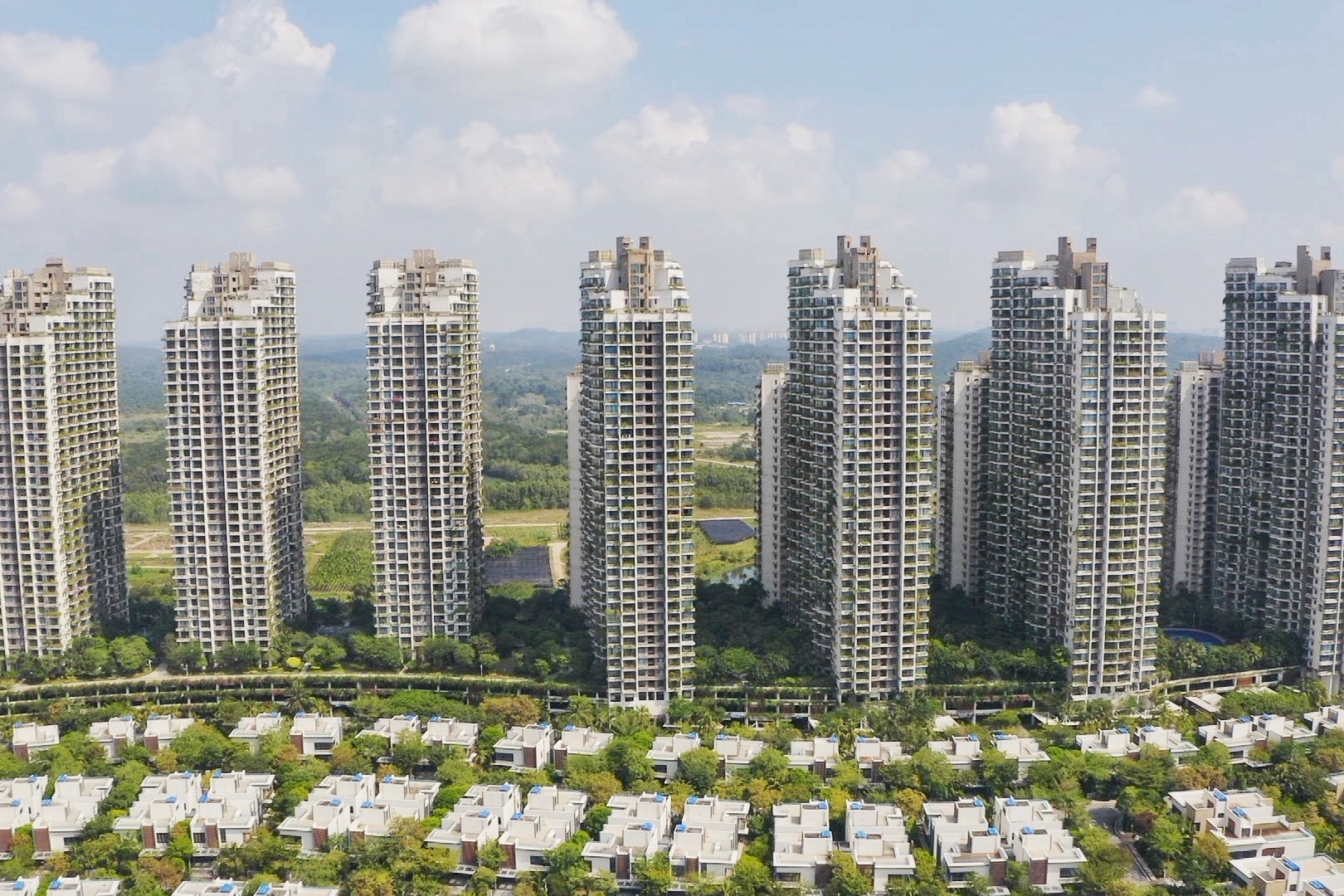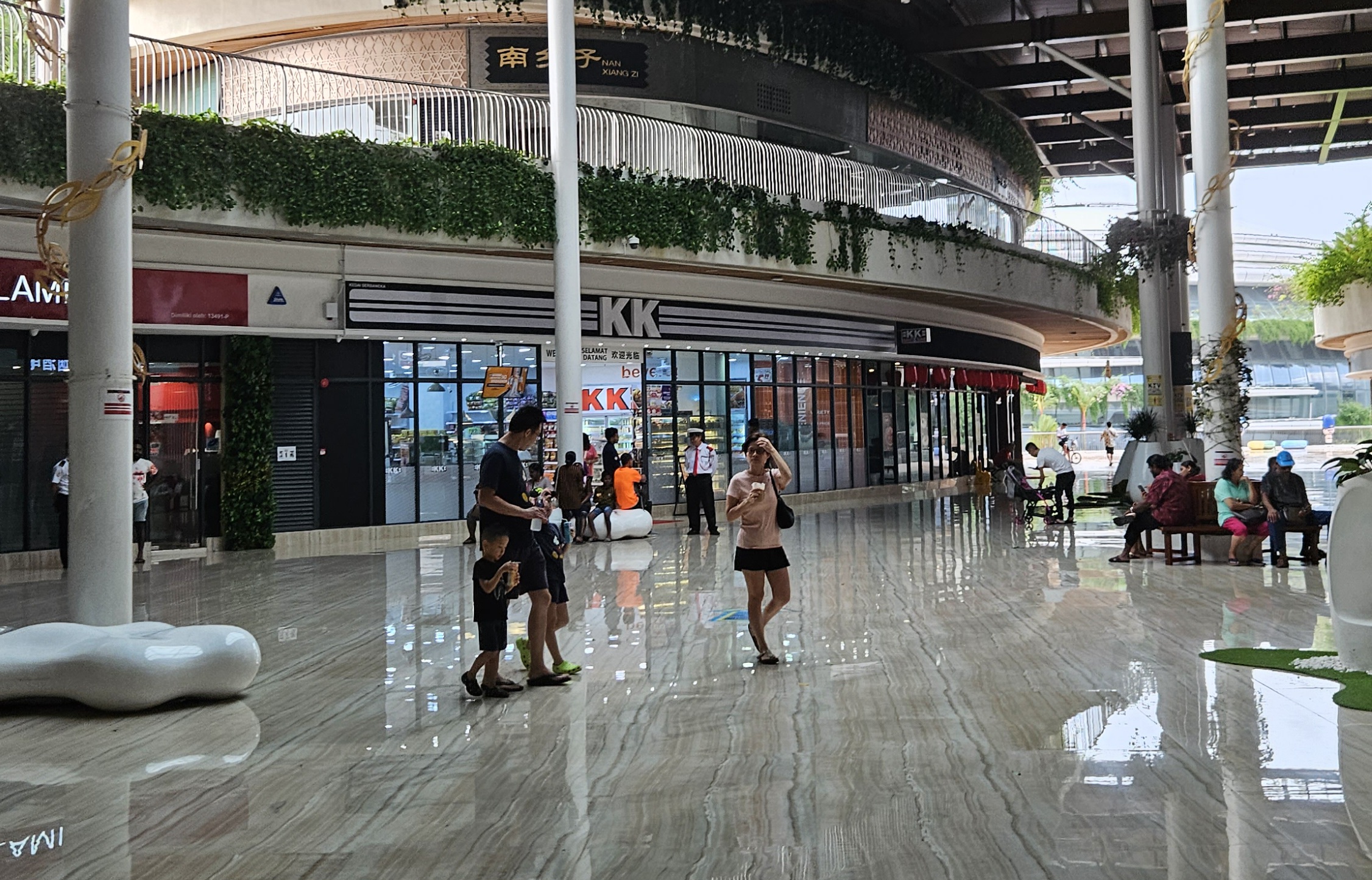
Johor Bahru, Malaysia – Built along Malaysia’s southern Johor state coast, the 2,833-hectare (7,000 acres) Forest City boasts high-rise apartments overlooking Singapore aimed at Chinese nationals dreaming of a luxury home on a sunny, tropical isle.
Landscaped with palm-fringed beaches and lush greenery, the futuristic metropolis has since floundered, hampered by economic controls, local politics and the COVID-19 pandemic.
Developed by the financially troubled Chinese property giant Country Garden, the city’s developers are now trying to revitalise a place where a mere 9,000 people live in its 28,000 housing units.
Standing inside his nearly empty grocery store below one of the high-rises, Chinese national Sun Qibin, in his 30s, said business had picked up recently but was still slow.
“There are more people coming from China now,” he told Al Jazeera, as a handful of people passed by his ground floor shop on a quiet November evening. “[But] during ordinary times, the business isn’t good.”
Officially launched in 2016, the planned $100bn project saw luxury properties going up as authorities granted it duty-free status and tax breaks to make it attractive to mainland Chinese buyers.
Situated by the Johor Strait with views of the Singapore border just a 20-minute drive away, Forest City was supposed to have a population of 700,000 people across four reclaimed islands by 2035.

But Chinese limits on overseas capital flight and a harsh three-year pandemic border restriction meant demand dried up and just 700 acres, or 10 percent of the total project, has been completed. Doubts increased when former Malaysian Prime Minister Mahathir Mohamad said in 2018 that foreigners would not be granted visas to live there.
Forest City’s regional vice president, Syarul Izam Sarifudin, said the city’s development was still “on track”, but admitted interest in the 5,000 unsold units was lacklustre.
“To us, it is still manageable … We are still selling two or three houses per month,” he told Al Jazeera.“There’s still a sentiment of people who would like to come enjoy the facilities … buy, stay here.”
He said buyers from more than 30 countries had bought properties in Forest City, adding that a possible “maximum” of up to 70 percent of those sold so far were in Chinese hands.
‘Doomed’
On a Malaysian public holiday afternoon in mid-November, a few hundred people were seen passing through the city’s main commercial area.
Many of the stores were closed, with most people heading to a small adjacent water park or duty-free outlets to buy alcoholic drinks.
A few others were tended to by Mandarin-speaking staff in a sales gallery as they viewed a huge model of the fully envisioned city with blinking lights built to scale.
Only a handful of restaurants were open as tourists rode rented electric scooters by a beach where a lonely yacht sat near signs that warned against swimming due to crocodiles.

KGV International property consultant Samuel Tan said the high proportion of foreign ownership had stunted Forest City’s chances at success.
“Any project where the majority is more than 40 percent of foreigners is doomed for failure,” he said. “[This is] because they don’t come here, they don’t occupy [the properties] here, they don’t spend money here.”
He said the project’s developers instead needed to attract Malaysians or Singaporeans.
Forest City estimates that 80 percent of the city’s 9,000 population are tenants, many working in Singapore or a nearby container port in Johor, while the rest are homeowners.
One of the tenants is Yvonne Xavier, who rents a fully-furnished two-bedroom apartment for 850 ringgit ($182) a month, several times cheaper than in Singapore where her husband works.
“I like living here because it is cosy and very quiet. It’s too noisy in town,” the 29-year-old Malaysian said, referring to the state capital Johor Bahru, some 30 kilometres away.
Although generally safe, Xavier said some street lights were not turned on at night, and she was concerned with the behaviour of those coming for the cheap alcohol.
“They stop on the roadside and they start drinking, and they do this every day,” she said.
New incentives
In an effort to boost the area, Malaysian Prime Minister Anwar Ibrahim in August announced a special financial zone in Forest City with incentives including multiple entry visas, and special income tax rates.

He joined Singapore premier Lee Hsien Loong in October to announce a special Johor-Singapore economic zone, with a memorandum of understanding to be signed by the two countries in January.
But despite the initiatives, Forest City faces an uncertain future as property developers in China grapple with mounting debt amid a national housing crisis.
Forest City is 60 percent owned by Country Garden, with the rest held by a local company in which influential Johor state ruler Sultan Ibrahim Sultan Iskandar, who will become the country’s king in January, has a controlling stake.
With some $186bn in total liabilities, Country Garden failed to make a $15.4m interest payment on its dollar bonds in October. Its shares have lost more than two-thirds of their value this year.
The Reuters news agency reported earlier this month that insurance giant Ping An had been ordered by Chinese authorities to take a controlling stake in the company, which Ping An later denied.
Syarul, the regional vice president, sidestepped questions on Country Garden’s issues, but said he remained hopeful for Forest City, citing “good support” from Malaysia and China, and the planned economic zones.
“We cannot … fall back or move from what we have planned,” he said, adding that 20 billion ringgit ($4.3bn) had been spent on the project so far.
He added that details on the zones were not yet set, but suggested that the city’s owners would be looking into fields like banking and technology rather than real estate.
A female Chinese shopkeeper who identified herself merely as Qiqi, in her 30s, said she had been in Forest City for six years and was keen to stay despite the problems.
“Why do we carry on? We believe that if the special economic zone’s plan is implemented, it will be good news for us,” she said. “We hope that after the special economic zone is developed, it will become a similar situation like Hong Kong and Shenzhen. It will become very good.”







